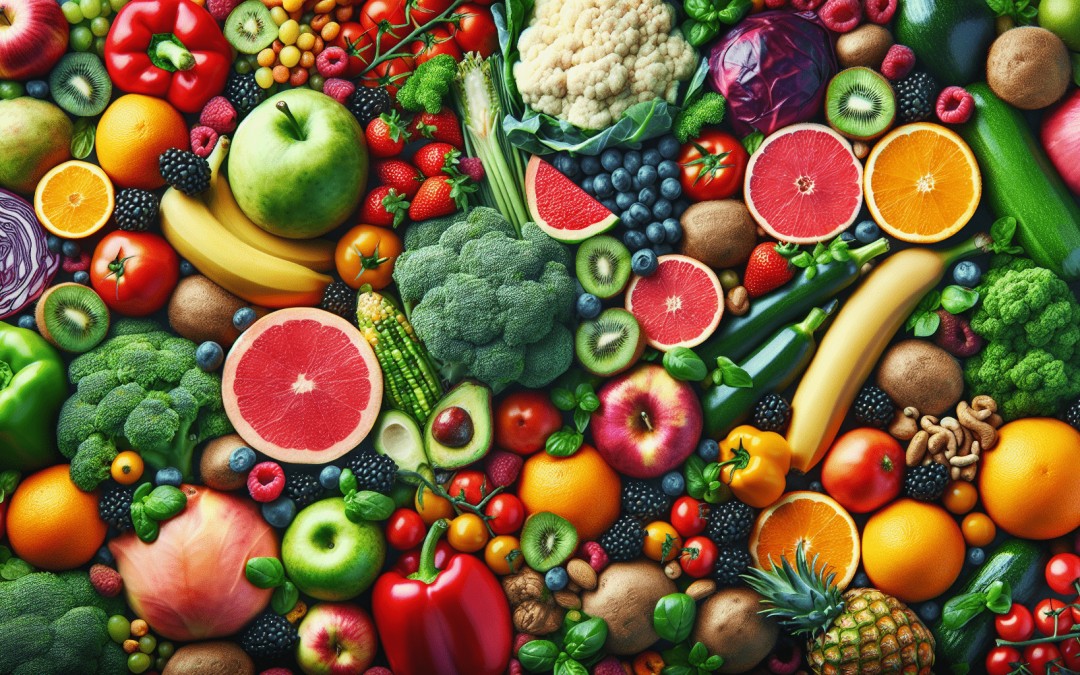If you’re looking to improve your overall health and well-being, then it’s time to discover the incredible benefits of incorporating whole foods into your diet. Whole foods, with their natural and unprocessed goodness, can truly elevate your health to new heights. Packed with essential nutrients, vitamins, minerals, and antioxidants, they nourish your body from the inside out, promoting optimal functioning and vitality. Say goodbye to processed foods and hello to a vibrant, energetic lifestyle by embracing the power of whole foods.
Introduction to Whole Foods
What are Whole Foods?
Whole foods are natural, unprocessed foods that are as close to their original state as possible. They are not stripped of their nutrients or altered with additives, making them a healthier option for our bodies. Whole foods are rich in vitamins, minerals, fiber, and antioxidants, providing numerous health benefits.
Understanding the Importance of Whole Foods
In a world where processed and convenience foods dominate the market, understanding the importance of whole foods is crucial for our overall well-being. Whole foods nourish our bodies with essential nutrients, promote optimal digestion, support weight management, boost energy levels, and reduce the risk of chronic diseases. By embracing the power of whole foods, we can take control of our health and elevate our well-being.
Benefits of Whole Foods
Nutrient-Rich Diet
One of the key benefits of consuming whole foods is their high nutrient content. Whole foods, such as fruits, vegetables, whole grains, legumes, nuts, seeds, and lean proteins, are packed with vitamins, minerals, and antioxidants essential for the proper functioning of our bodies. By including a variety of whole foods in our diet, we can ensure that our bodies receive the necessary nutrients to thrive.
Improved Digestion
Whole foods are naturally high in fiber, which plays a vital role in maintaining a healthy digestive system. Fiber helps regulate bowel movements, prevents constipation, and promotes a healthy gut microbiome. By incorporating whole foods into your diet, you can experience improved digestion and say goodbye to digestive discomfort.
Enhanced Weight Management
Whole foods are a cornerstone of a balanced and healthy diet, making them a fantastic tool for weight management. Unlike processed foods, which are often calorie-dense and low in nutrients, whole foods provide more volume and nutrients without excessive calories. When you prioritize whole foods, you can feel satisfied while controlling your calorie intake, helping you achieve and maintain a healthy weight.
Increased Energy Levels
Are you tired of relying on caffeine or sugary snacks for an energy boost? Whole foods can naturally increase your energy levels and leave you feeling more energetic throughout the day. By consuming whole foods that are rich in complex carbohydrates, healthy fats, and lean proteins, you provide your body with a sustained source of energy, avoiding energy crashes commonly associated with processed foods.
Reduced Risk of Chronic Diseases
The power of whole foods extends beyond immediate benefits to long-term health. Research has consistently shown that a diet rich in whole foods can reduce the risk of chronic diseases, such as heart disease, diabetes, and certain types of cancer. Whole foods, with their abundance of antioxidants, phytochemicals, and anti-inflammatory properties, act as protective agents, bolstering our immune system and promoting optimal health.

Types of Whole Foods
Fruits and Vegetables
Fruits and vegetables are the foundation of a whole foods diet. They are packed with vitamins, minerals, fiber, and disease-fighting antioxidants. Aim to incorporate a rainbow of colors into your meals by consuming a variety of fruits and vegetables. Whether enjoyed fresh, steamed, sautéed, or roasted, fruits and vegetables provide endless possibilities for nourishing and delicious meals.
Whole Grains
Unlike refined grains, which have been stripped of their germ and bran, whole grains retain their natural nutritional value. Examples of whole grains include quinoa, brown rice, oats, whole wheat, and barley. They are excellent sources of fiber, B vitamins, minerals, and antioxidants. Replace processed grains with whole grains to enjoy more nutrients and add a satisfying texture to your meals.
Legumes and Beans
Legumes and beans, such as lentils, chickpeas, black beans, and kidney beans, are nutritional powerhouses that provide plant-based protein, fiber, and a variety of essential nutrients. They are versatile ingredients that can be used in soups, stews, salads, or as a meat substitute in various dishes. By including legumes and beans in your diet, you enhance the nutritional profile of your meals and promote a healthier lifestyle.
Nuts and Seeds
Nuts and seeds are nutrient-dense foods that offer a wide range of health benefits. They are rich in healthy fats, protein, fiber, vitamins, and minerals. Almonds, walnuts, chia seeds, flaxseeds, and pumpkin seeds are just a few examples of these nutritional powerhouses. Adding nuts and seeds to your meals or enjoying them as snacks can provide a satisfying crunch and boost your overall nutrient intake.
Lean Proteins
Lean proteins, including poultry, fish, tofu, tempeh, and legumes, are essential for a well-rounded whole foods diet. They provide high-quality protein, essential amino acids, vitamins, and minerals needed for muscle growth, repair, and overall bodily functions. Opting for lean sources of protein ensures that you are fueling your body with quality nutrition without excessive unhealthy fats.
Including Whole Foods in Your Diet
Planning Meals around Whole Foods
Incorporating whole foods into your diet starts with planning well-balanced meals. Take the time to create a weekly meal plan that includes a variety of fruits, vegetables, whole grains, legumes, lean proteins, and healthy fats. By having a clear plan ahead of time, you can ensure that your meals are nourishing, satisfying, and packed with whole foods.
Shopping for Whole Foods
When it comes to shopping for whole foods, prioritize fresh, unprocessed options. Head to your local farmer’s market or grocery store and fill your cart with a colorful array of fruits and vegetables. Choose whole grains, such as brown rice or whole wheat bread, over refined options. Look for minimally processed lean proteins, like skinless poultry or fresh fish. Remember to read labels carefully and avoid products with added sugars or artificial ingredients.
Cooking and Preparing Whole Foods
Cooking and preparing whole foods can be an enjoyable and creative experience. Experiment with different cooking methods, such as steaming, roasting, or sautéing, to enhance flavors and retain nutrients. Try new recipes that feature whole foods as the star ingredients. Get adventurous in the kitchen and make the most of your whole foods to create delicious and healthy meals.

Tips for Incorporating Whole Foods into Your Lifestyle
Start with Small Changes
Incorporating whole foods into your lifestyle doesn’t have to be overwhelming. Start with small changes by swapping processed snacks with fresh fruits or replacing refined grains with whole grain alternatives. Over time, these small changes will add up, and you’ll find yourself naturally gravitating towards whole foods.
Experiment with Different Recipes
Eating whole foods doesn’t mean sacrificing flavor or variety. Explore different recipes that showcase the versatility of whole foods. From smoothies and salads to stir-fries and homemade soups, there is no shortage of meal options that can be made with whole foods. Get creative in the kitchen and discover new flavors that will keep your meals exciting and nourishing.
Shop Locally and Seasonally
Supporting local farmers and purchasing seasonal produce is not only beneficial for your health but also for the environment. Locally-sourced whole foods are often fresher and more nutrient-rich since they don’t have to travel long distances. By shopping locally and seasonally, you also contribute to sustainable farming practices and reduce the carbon footprint associated with transporting food.
Avoid Processed Foods
Processed foods are often loaded with unhealthy additives, preservatives, and excessive salt or sugar. To embrace a whole foods lifestyle, try to minimize your intake of processed foods. Read labels carefully and choose whole, unprocessed options whenever possible. By avoiding processed foods, you can focus on nourishing your body with real, nutrient-rich foods.
Meal Prep and Planning
Meal prepping can be a game-changer when it comes to maintaining a whole foods lifestyle, especially if you have a busy schedule. Take some time each week to plan and prepare meals in advance. This way, you’ll always have wholesome options available, even during busy days. By incorporating meal prep into your routine, you eliminate the temptation of resorting to less healthy options.
Understanding Organic and Locally-Sourced Whole Foods
Benefits of Organic Foods
Organic foods are grown without the use of synthetic pesticides, chemical fertilizers, or genetically modified organisms (GMOs). Choosing organic whole foods ensures that you are consuming produce that is free from potentially harmful chemicals. Organic farming practices also prioritize soil health and sustainability, making organic foods an excellent choice for both your health and the environment.
Benefits of Locally-Sourced Foods
Locally-sourced whole foods have their own set of benefits. By supporting local farmers, you promote a stronger local economy and help preserve farmland. Locally-sourced foods are often harvested at peak freshness, meaning you get to enjoy the most flavorful and nutrient-dense produce available. Additionally, by reducing the distance your food needs to travel, you decrease the environmental impact associated with transportation.

Common Misconceptions about Whole Foods
Whole Foods are Expensive
While it’s true that some organic or specialty whole foods can be more expensive, many whole foods are actually budget-friendly. Fresh fruits, vegetables, grains, and legumes can be very affordable, especially when purchased in-season and in bulk. By prioritizing whole foods and making informed choices, you can enjoy the health benefits without breaking the bank.
Whole Foods are Boring and Tasteless
Don’t be fooled by the misconception that whole foods are bland and boring. The world of whole foods is vast and offers an abundance of flavors, textures, and culinary possibilities. With the right herbs, spices, and cooking techniques, you can transform simple whole ingredients into mouthwatering dishes that both nourish and delight your taste buds.
Whole Foods takes a lot of Time to Prepare
While it’s true that cooking whole foods from scratch can take more time than reheating a pre-packaged meal, it doesn’t have to be a time-consuming task. With proper planning, efficient meal prepping, and utilizing time-saving cooking techniques, incorporating whole foods into your daily routine can be manageable even for the busiest individuals. The extra effort is well worth the health benefits and the flavorful meals you’ll enjoy.
Whole Foods and Sustainability
Reduced Environmental Impact
Choosing whole foods over processed options has a significant positive impact on the environment. Whole foods require less packaging and processing, which reduces waste and carbon emissions. By embracing a whole foods lifestyle, you contribute to environmental sustainability by reducing your ecological footprint.
Supporting Local Farmers and Agriculture
When you prioritize whole foods sourcing, especially by supporting local farmers, you foster a strong connection between consumers and producers. By buying directly from local farmers, you support sustainable farming practices, fair trade, and help preserve the traditional knowledge and diversity of agricultural practices.
Preserving Biodiversity
Whole foods, particularly those sourced locally, often come from small-scale farming systems that encourage biodiversity. By supporting these farming practices, you contribute to preserving a variety of plant and animal species. The use of diverse crops and traditional agricultural methods promotes ecological balance and resilience, ensuring the preservation of valuable ecosystems.
Whole Foods for Special Dietary Needs
Whole Foods for Vegan and Vegetarian Diets
Whole foods provide a plethora of options for individuals following vegan or vegetarian diets. Fruits, vegetables, legumes, nuts, seeds, and whole grains are all staples in plant-based diets. These whole foods offer a wide range of nutrients, including protein, iron, calcium, and omega-3 fatty acids, ensuring that vegans and vegetarians can meet their nutritional needs while enjoying a varied and delicious diet.
Whole Foods for Gluten-Free Diets
For individuals with gluten intolerance or celiac disease, whole foods are a vital component of a gluten-free diet. Whole grains such as quinoa, rice, millet, and buckwheat are excellent alternatives to gluten-containing grains, providing essential nutrients without triggering adverse reactions. Additionally, fresh fruits, vegetables, legumes, nuts, and seeds are gluten-free and should be prioritized in a gluten-free diet.
Whole Foods for Paleo Diets
The paleo diet emphasizes whole, unprocessed foods that would have been available to our ancestors during the Paleolithic era. This means focusing on lean meats, fish, fruits, vegetables, nuts, and seeds while avoiding grains, dairy, and processed foods. By adhering to a paleo diet, individuals can eliminate potential food sensitivities, reduce inflammation, and support a nutrient-rich whole foods lifestyle.
Whole Foods for DASH Diet
The Dietary Approaches to Stop Hypertension (DASH) diet is centered around whole foods that are low in sodium and rich in nutrients. It emphasizes fruits, vegetables, whole grains, lean proteins, and low-fat dairy products while minimizing the consumption of high-sodium processed foods. By adopting a DASH diet, individuals can lower blood pressure, reduce the risk of heart disease, and promote overall cardiovascular health.
Conclusion
The power of whole foods is undeniable. By embracing a whole foods lifestyle, you nourish your body with essential nutrients, support digestion, manage weight, increase energy levels, and reduce the risk of chronic diseases. Incorporating whole fruits, vegetables, grains, legumes, nuts, seeds, and lean proteins into your diet provides a solid foundation for optimal health. Start with small changes, experiment with recipes, and prioritize shopping for organic and locally-sourced whole foods. Remember, your health is an investment, and committing to a whole foods lifestyle is a gift you give yourself every day. Elevate your health, transform your well-being, and enjoy the abundance of flavors and benefits that whole foods have to offer.








